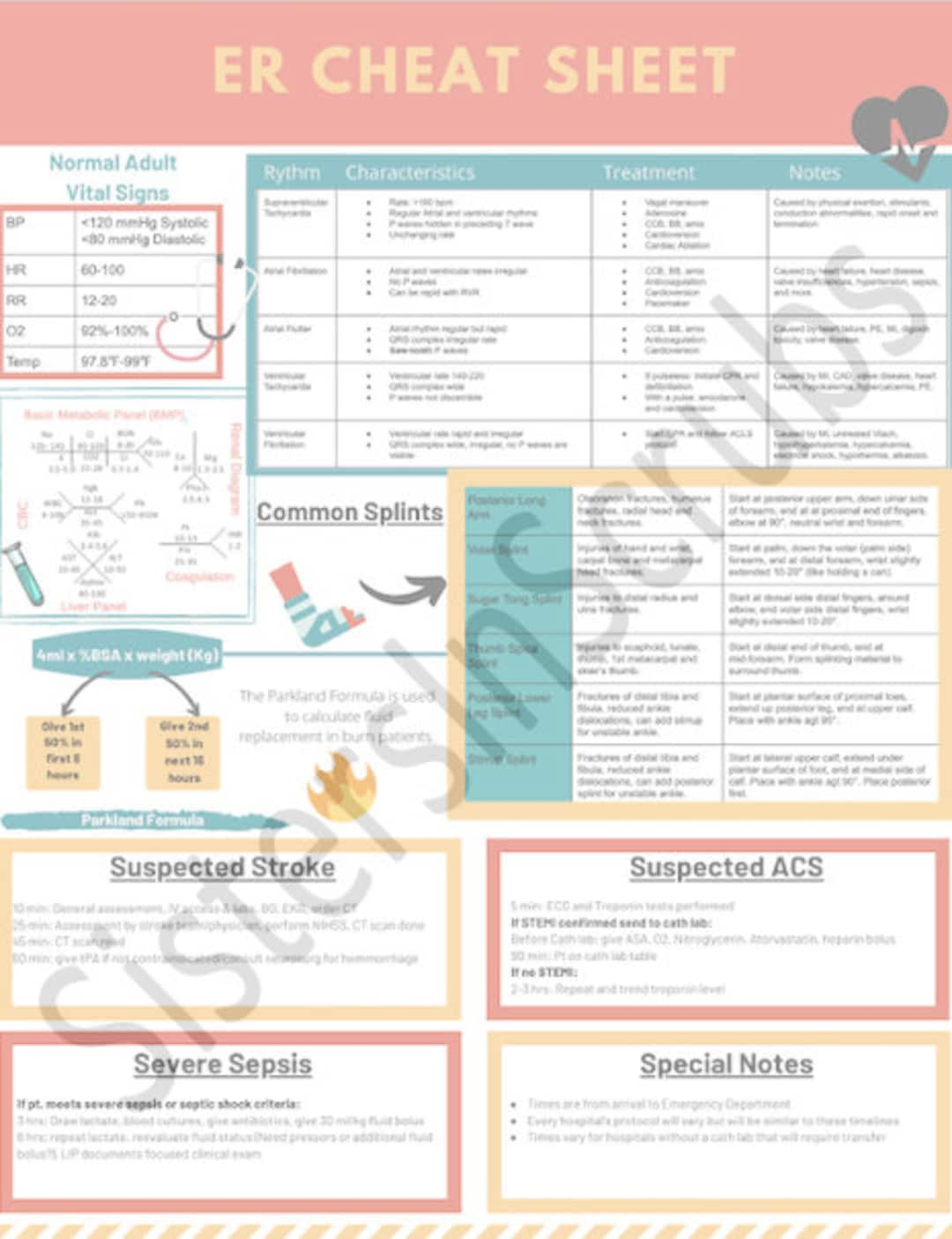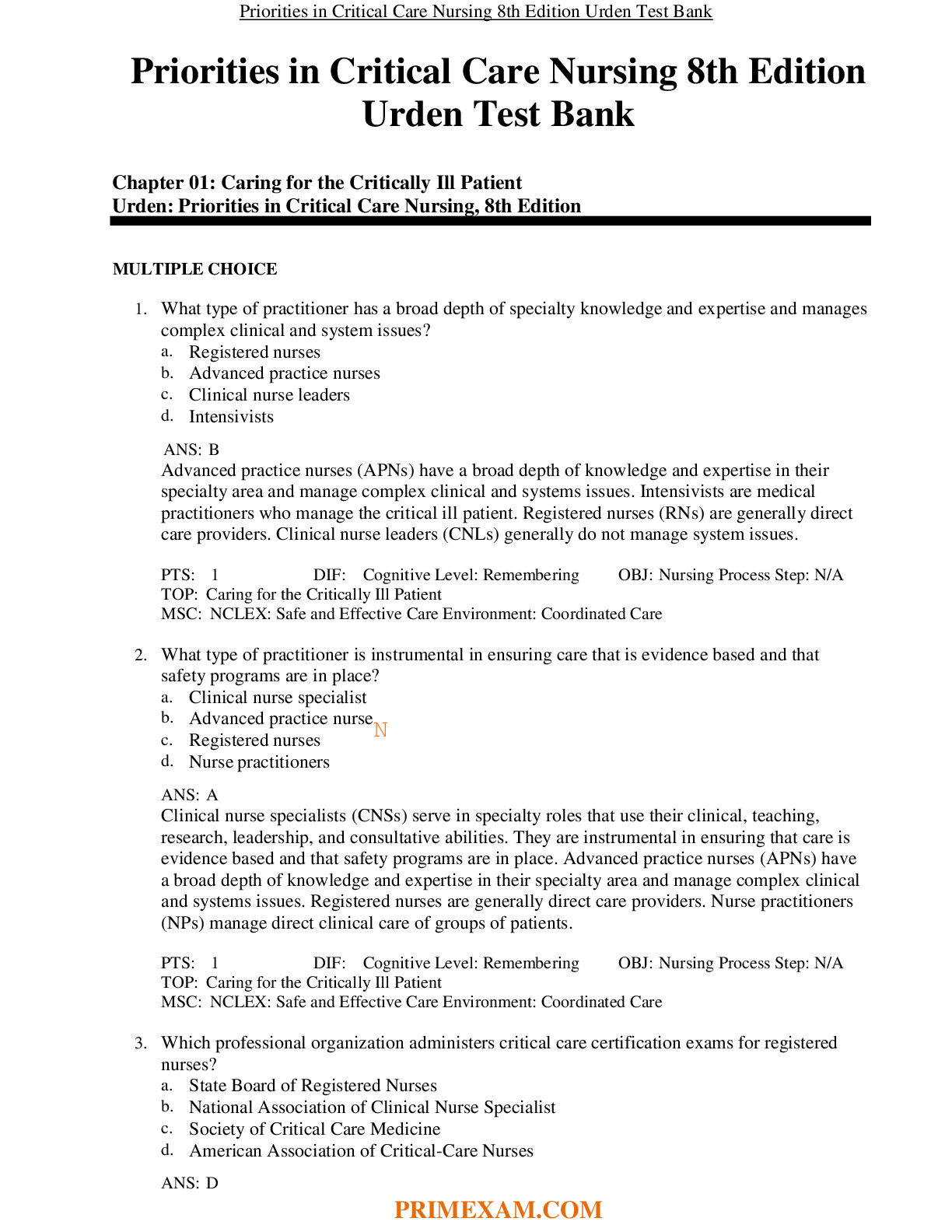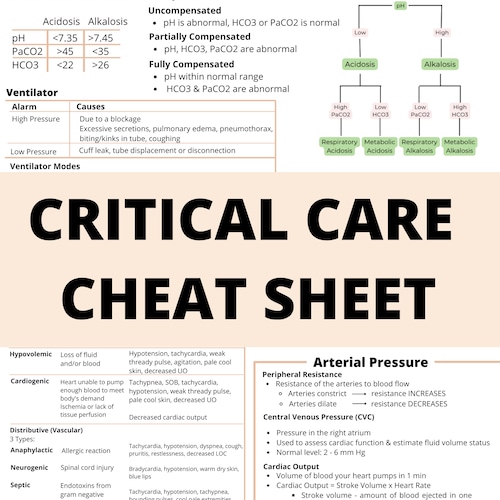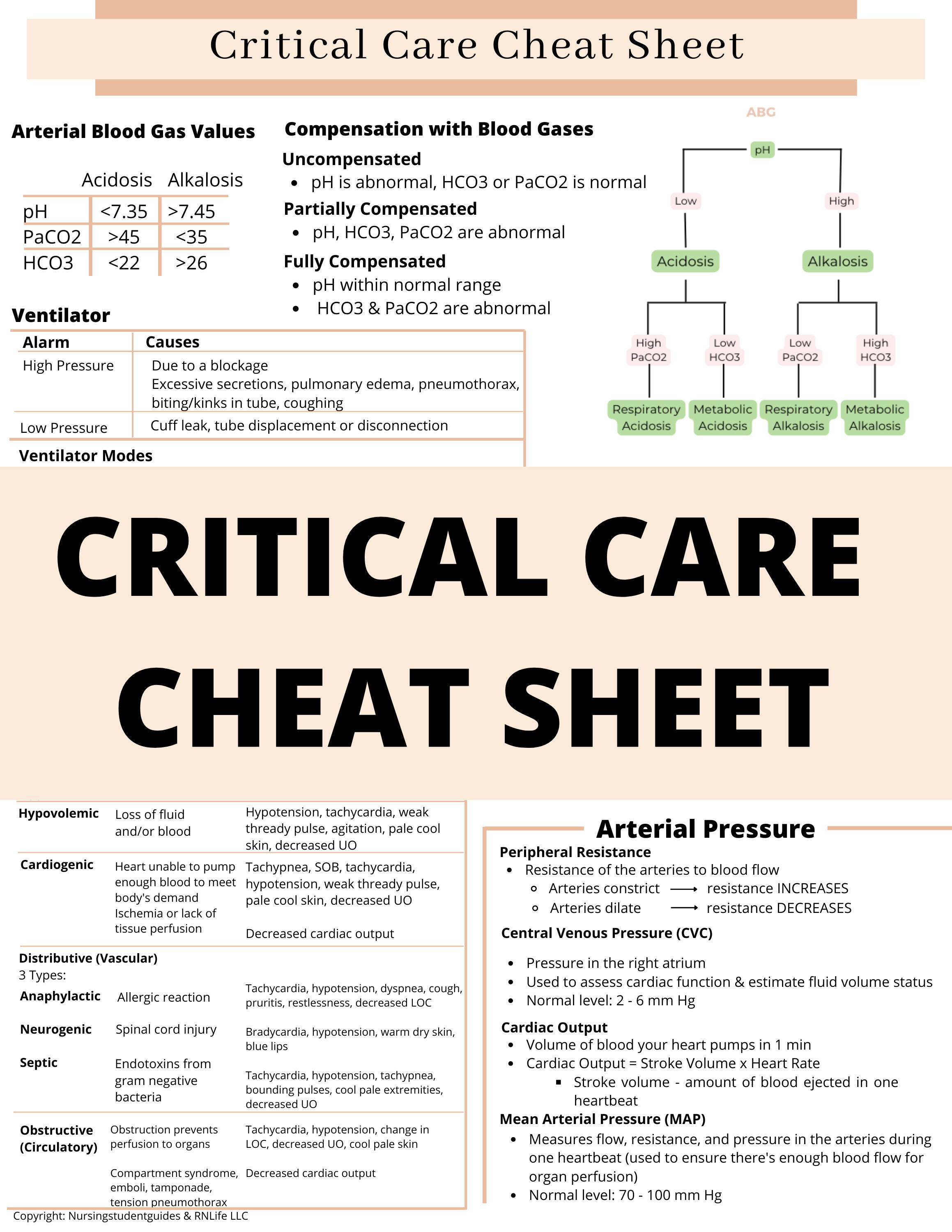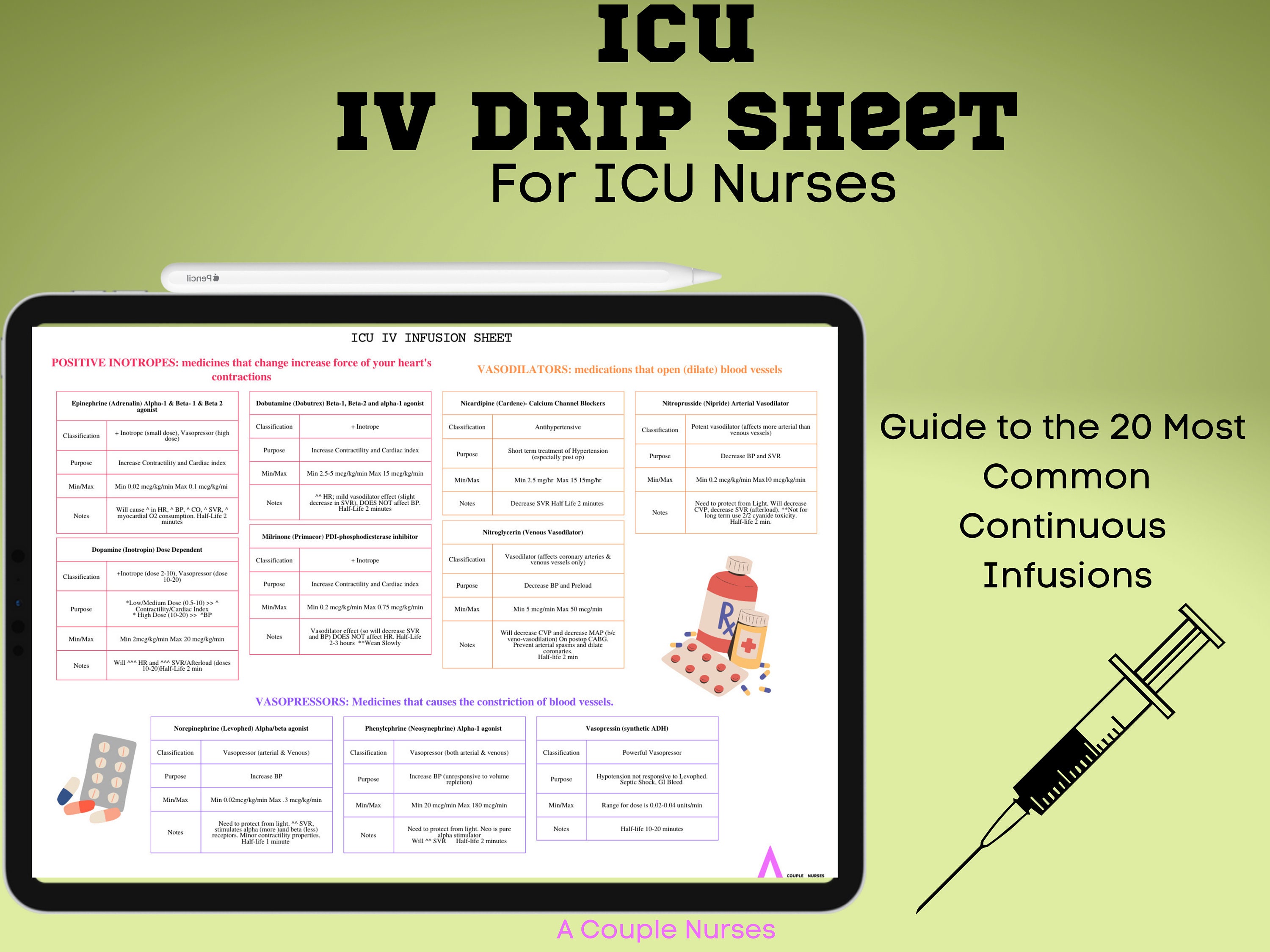Critical Care Nursing Cheat Sheets - Ed critical care cheat sheet tpa n cva: 0.9 mg/kg (10% bolus/90% over 1 hr) n pe: 100 mg iv over 2 hrs, bolus if cardiac arrest hyperkalemia. Vital signs, gcs, abgs, electrolytes, sepsis, acls, ventilator settings, and medications. One of the most important things we do in critical care is manage pain and anxiety while avoiding delirium. Quick reference guide for critical care nursing: Assist control ventilation (acv) or (cmv) also known as continuous mandatory ventilation (cmv) that delivers a fixed volume of o2 to patient.
100 mg iv over 2 hrs, bolus if cardiac arrest hyperkalemia. One of the most important things we do in critical care is manage pain and anxiety while avoiding delirium. Ed critical care cheat sheet tpa n cva: Vital signs, gcs, abgs, electrolytes, sepsis, acls, ventilator settings, and medications. 0.9 mg/kg (10% bolus/90% over 1 hr) n pe: Quick reference guide for critical care nursing: Assist control ventilation (acv) or (cmv) also known as continuous mandatory ventilation (cmv) that delivers a fixed volume of o2 to patient.
One of the most important things we do in critical care is manage pain and anxiety while avoiding delirium. Ed critical care cheat sheet tpa n cva: 0.9 mg/kg (10% bolus/90% over 1 hr) n pe: Quick reference guide for critical care nursing: Assist control ventilation (acv) or (cmv) also known as continuous mandatory ventilation (cmv) that delivers a fixed volume of o2 to patient. 100 mg iv over 2 hrs, bolus if cardiac arrest hyperkalemia. Vital signs, gcs, abgs, electrolytes, sepsis, acls, ventilator settings, and medications.
ER Nursing Nursing Cheat Sheets Nursing School Nurse Gift
Vital signs, gcs, abgs, electrolytes, sepsis, acls, ventilator settings, and medications. Assist control ventilation (acv) or (cmv) also known as continuous mandatory ventilation (cmv) that delivers a fixed volume of o2 to patient. 100 mg iv over 2 hrs, bolus if cardiac arrest hyperkalemia. Ed critical care cheat sheet tpa n cva: One of the most important things we do.
Priorities in Critical Care Nursing 8th Edition Urden Test Bank.Answers
100 mg iv over 2 hrs, bolus if cardiac arrest hyperkalemia. 0.9 mg/kg (10% bolus/90% over 1 hr) n pe: Assist control ventilation (acv) or (cmv) also known as continuous mandatory ventilation (cmv) that delivers a fixed volume of o2 to patient. Quick reference guide for critical care nursing: One of the most important things we do in critical care.
Nursing student cheat sheet critical care hemodynamics cardiac
Assist control ventilation (acv) or (cmv) also known as continuous mandatory ventilation (cmv) that delivers a fixed volume of o2 to patient. One of the most important things we do in critical care is manage pain and anxiety while avoiding delirium. 0.9 mg/kg (10% bolus/90% over 1 hr) n pe: 100 mg iv over 2 hrs, bolus if cardiac arrest.
Click through for the downloadable version of this ICU drips reference
0.9 mg/kg (10% bolus/90% over 1 hr) n pe: 100 mg iv over 2 hrs, bolus if cardiac arrest hyperkalemia. Quick reference guide for critical care nursing: Assist control ventilation (acv) or (cmv) also known as continuous mandatory ventilation (cmv) that delivers a fixed volume of o2 to patient. Vital signs, gcs, abgs, electrolytes, sepsis, acls, ventilator settings, and medications.
Critical Care Nursing Cheat Sheet
One of the most important things we do in critical care is manage pain and anxiety while avoiding delirium. Ed critical care cheat sheet tpa n cva: Assist control ventilation (acv) or (cmv) also known as continuous mandatory ventilation (cmv) that delivers a fixed volume of o2 to patient. 100 mg iv over 2 hrs, bolus if cardiac arrest hyperkalemia..
Intensive Care Mechanical Ventilation Cheat Sheet for Nurses and
0.9 mg/kg (10% bolus/90% over 1 hr) n pe: Quick reference guide for critical care nursing: 100 mg iv over 2 hrs, bolus if cardiac arrest hyperkalemia. Vital signs, gcs, abgs, electrolytes, sepsis, acls, ventilator settings, and medications. Ed critical care cheat sheet tpa n cva:
Critical Care Cheat Sheet Nursing Notes Nursing School Etsy
0.9 mg/kg (10% bolus/90% over 1 hr) n pe: One of the most important things we do in critical care is manage pain and anxiety while avoiding delirium. Quick reference guide for critical care nursing: Vital signs, gcs, abgs, electrolytes, sepsis, acls, ventilator settings, and medications. Ed critical care cheat sheet tpa n cva:
Critical Care Cheat Sheet Nursing Notes Nursing School Etsy Canada
0.9 mg/kg (10% bolus/90% over 1 hr) n pe: Ed critical care cheat sheet tpa n cva: Quick reference guide for critical care nursing: 100 mg iv over 2 hrs, bolus if cardiac arrest hyperkalemia. Assist control ventilation (acv) or (cmv) also known as continuous mandatory ventilation (cmv) that delivers a fixed volume of o2 to patient.
Critical Care Nursing Cheat Sheet
Quick reference guide for critical care nursing: 100 mg iv over 2 hrs, bolus if cardiac arrest hyperkalemia. 0.9 mg/kg (10% bolus/90% over 1 hr) n pe: Vital signs, gcs, abgs, electrolytes, sepsis, acls, ventilator settings, and medications. Assist control ventilation (acv) or (cmv) also known as continuous mandatory ventilation (cmv) that delivers a fixed volume of o2 to patient.
Critical Care Drip Guide Cheat Sheet for Cardiac Drips Vasopressors
Ed critical care cheat sheet tpa n cva: One of the most important things we do in critical care is manage pain and anxiety while avoiding delirium. 0.9 mg/kg (10% bolus/90% over 1 hr) n pe: Vital signs, gcs, abgs, electrolytes, sepsis, acls, ventilator settings, and medications. 100 mg iv over 2 hrs, bolus if cardiac arrest hyperkalemia.
One Of The Most Important Things We Do In Critical Care Is Manage Pain And Anxiety While Avoiding Delirium.
100 mg iv over 2 hrs, bolus if cardiac arrest hyperkalemia. Ed critical care cheat sheet tpa n cva: Quick reference guide for critical care nursing: Assist control ventilation (acv) or (cmv) also known as continuous mandatory ventilation (cmv) that delivers a fixed volume of o2 to patient.
0.9 Mg/Kg (10% Bolus/90% Over 1 Hr) N Pe:
Vital signs, gcs, abgs, electrolytes, sepsis, acls, ventilator settings, and medications.
